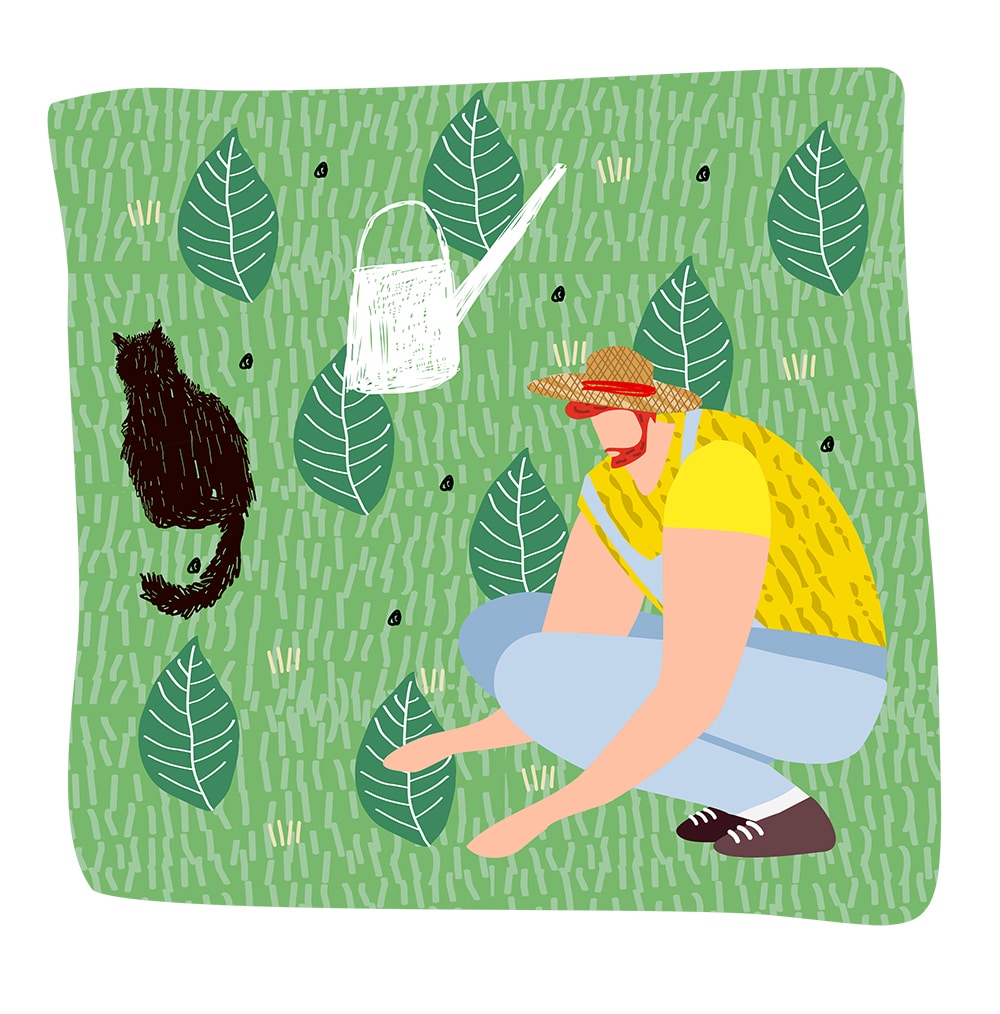
Community Gardens Blossom in Clark County
As spring approaches, gardeners begin planning what to plant for the coming season. As the Evergreen State, many fruits and flowers are easy to grow here. When I lived in an apartment, the only growing space we had was a few small boxes of peas and strawberries on the patio for our kids to enjoy. At that time, having a real garden felt like an unrealistic dream.
Enter the community garden: An area of land set aside by the city or county where community members can rent out a section of land for the season and make it their own.
Benefitting People and Plants

Some of the first community gardens in the U.S. started up during a recession in the 1890s. Vacant lots in Detroit, Michigan were used to help feed recently laid off industrial workers. The mayor sponsored the plan to get men back to work and fed. It was so successful that other large cities copied his initiative. During wartimes, citizens were encouraged to grow gardens to help the United States supply food and troops overseas. “Victory Gardens” of World War II are estimated to have produced as much as 40% of all vegetables in the U.S.
Today, community gardens continue to adapt to the needs of the local citizens. EatWell Camas, whose mission is to create equitable opportunities for community members to connect to the land, offers low-cost garden plots. “Being a part of a community garden offers so many benefits,” shares board president Jacquie Hill. “Gardens of all kinds give you the chance to supplement your grocery bill, which is needed now more than ever, and community gardens in particular give folks a chance to grow their food even if they do not have a yard or patio to do so.”
In 2023, “Share the Harvest partnered with SNAP-Ed Supplemental Nutrition Assistance Program to help feed hungry families in our community,” says Ringo Nickel, Washington State University Extension coordinator. “Community garden participants donated their extra produce at an onsite donation station. Donations were collected and taken to a food pantry in Hazel Dell and the Clark County Food Bank . . . A total of 368 pounds of organic garden produce was donated which is equivalent to 350 meals and valued at $1,836.32.”
Angela Brunelle, public works administrative assistant for the City of Washougal says that in addition to increasing access to healthy food, “[Community gardens] improve food security and reduce food miles. [They also] increase physical activity and improve fitness [by] improving dietary habits and reducing the risk of obesity and obesity-related diseases, improving mental health, and promoting relaxation.” While being a healthful practice for people, Brunelle adds that community gardening can, “reduce pollution and environmental hazards [by] teaching gardening skills and ecological awareness.” In fact, all community gardens in Clark County have a focus on sustainability through composting, natural pest management, and/or water saving gardening methods.
“We are a unique community garden space as we do not have water access on our property,” shares Hill. “We have solved this problem by adding external water catchment tanks. Our gardeners pull water off of the smaller tanks and our staff or volunteers fill these once or twice a week depending on demand. We also do a fair amount of educating with our gardeners each season about how to grow more by watering less. One of the strategies we use is ollas.” Aztec in origin, “Ollas are clay pots that are buried in the soil and filled as needed,” explains Hill. “The plants’ roots can pull water from the ollas as needed and this allows not only a more even watering, but also uses less water throughout the season; the water is not wasted and the plants are watered at a deeper level. We offer our gardeners an olla workshop at the beginning of each season to help them understand the benefit of using these clay pots to water deeply and slowly. Our gardeners have found a lot of benefits and grown amazing crops using ollas.”
Getting a Garden Started

Community gardens are one of the best places for a novice gardener to begin. Hill notes that, “Community connection and an opportunity to meet folks that enjoy growing food and flowers,” is a huge benefit of growing in a community. She suggests, “If you don’t know how to solve a problem, likely, someone else does, so ask those questions! We have both novice and expert gardeners on our property. There are so many folks that have the answers you might be looking for.” The 5th Ave Community Garden run by EatWell Camas holds workdays where other gardeners are on site helping, making it a great time to meet other community members and ask questions.
Working near others to learn their tricks and get encouragement is incredibly convenient. However, if you need a true expert’s advice, master gardeners are available to answer questions and solve your gardening problems year-round. “Master gardener volunteers serve the community through a wide variety of offerings including giving workshops and presentations, caring for demonstration gardens, staffing our answer clinic where folks can call, email or stop by with their questions,” explains Erika Johnson, master gardener coordinator from WSU-Vancouver. “Our answer clinic can be reached via email at mganswerclinic@clark.wa.gov or by phone at 564-397-5711. We are open for walk-ins Tuesday and Wednesday 10 am to 2 pm and Thursday and Friday 11:30 am to 3 pm.”
Seed Selection and Sharing
For a first-time gardener, Johnson recommends vegetables. “Vegetables can be easy and can provide quick gratification. Radishes, lettuce, spinach and chard can be grown from seed in a spot with full sunlight, water and good soil. Tomatoes and peppers can be planted as starts, in either a large pot or in the ground.”
Though seeds may be a relatively small expense, an affordable way to access seeds is through the Seed Lending Library at Fort Vancouver Regional Libraries (FVRL). Available at the Vancouver, Washougal and White Salmon locations, community members have access to seeds that do well in our region. You can check out up to three seed packets a day (three flower and three vegetable), and once harvest time comes around, let a few of your plants go to seed then donate them back to the library. The FVRL website reminds you that only heirloom varieties have the ability to adapt and produce seeds. Visit fvrl.org/seed-library for information on seed harvesting and saving, or contact a trusty master gardener.
Make a Date with Your Garden
Having failed at tending a community garden myself, I know that finding the time to keep it up can be tricky. We had the best intentions. We had the planning and the seeds, but then life happened, and the garden did not. Plan to make time by putting it in your calendar, setting an alarm, or whatever will get you to remember your garden and its care is the best advice I can offer. Nhung (Dawn) Quan, an accounts payable specialist from Vancouver has rented a community garden plot at Marshall Park for two years. Her garden routine was simply to, “visit my garden every day after work to weed and water.” She also advises others to remember that, “Every gardener has good years for certain plants and not other years. It just varies.”
Throughout Clark County, many community gardens are just waiting for you to add your personal touch. As you work on your garden, you’re certain to feel satisfaction as you watch its progress and want to come back to see how it’s doing. My mom calls it provident living; as you plant the seeds, nurture them and watch them grow, you will then reap the rewards of your forward thinking.
Community Gardens in Clark County
Camas
5th Avenue Community Garden, 726 NE 5th Ave.

5th Avenue Community Garden by EatWell Camas has a lottery application which opens to veteran gardeners first. They also make sure to rotate the garden you are in each year, because “Gardeners are very likely to plant the same crop each year. By rotating the plots the gardeners use, we ensure the ability to rotate and protect the beds and allow for regrowth of the nutrients in the soil,” explains Hill. Three different size raised garden plots are made of reclaimed wood. ADA accessible plots include paved path access. Some scholarships are available. Hill reminds everyone it’s important to know and follow the garden rules wherever you plant, “We put a lot of thought and effort into creating the rules of our space to keep the space inclusive, safe, and joyful for everyone.”
Ridgefield
Ridgefield Community Garden, 224 S 5th Ave.
ridgefieldwa.us/308/Community-Garden
Blue Herron Community Garden has 21 plots of varying sizes, the largest of which is a 10’x10’. It also has a shed on site and a composting area for any leftover organic matter. New gardener registration begins on April 16. Returning gardener registration began February 7 for those who would like to use the same plot as last year.
Vancouver
City of Vancouver has five different community gardens with four different size options. Prices and sizes of the garden plots can be found on their website at cityofvancouver.us/government/department/parks-recreation-and-cultural-services/community-gardens.
Registration for the community plots began in late February, and plot assignments will be given on location after the garden opens for the season in mid-April.
Marshall Community Park Garden: 1009 E. McLoughlin Blvd.
LeRoy Haagen Community Park Garden: E 9th St., west of NE 136th Ave.
Campus Garden: Campus Dr. and 65th Ave.

Heritage Farms NE 78th St &, NE 19th Ct. Hazel Dell
Ellsworth Road Garden: SE 10th St. and Ellsworth Rd.
Fruit Valley Park Garden: 31st St. and Fruit Valley Rd.
Washington State University Extension
clark.wa.gov/public-works/community-gardens
Nickel describes 78th Street Heritage Farm Community Garden as a, “Perennial organic garden which has 88 community garden plots that are 20’x20’ at $75 a year.” This year-long garden with a community garden tool shed and a gardening lending library is perfect for people who want to use the same plot each year. “Unlike other community gardens that are pulled and tilled each year, we do not. This allows gardeners to stay as long as they like and follow the garden rules,” explains Nickel. This popular location does have a waiting list, so sign up soon to secure a future spot.
A registered national historic site, the Heritage Farm hosts many educational opportunities whether you farm there or not. Workshops by the Clark County Master Gardeners are held throughout the year for hands-on learning. Check out their upcoming classes at extension.wsu.edu/clark/master-gardeners/community-education.
Washougal
Washougal Downtown Community Garden, 2036 Main St.
cityofwashougal.us/217/community-gardens
Sign-ups for community gardens began in February. Community members can sign up for one of 52 garden boxes. “All boxes are 8’x4’ with two ADA compliant. The cost is $17 a box per season. We do offer low-income boxes for anyone that is making less than $20,000 a year for $14 a season and we also offer senior citizen boxed to anyone over 65 for $14 a season.” Brunelle continues that there are, “water faucets throughout the garden, hoses, picnic benches, and a small BBQ.”





